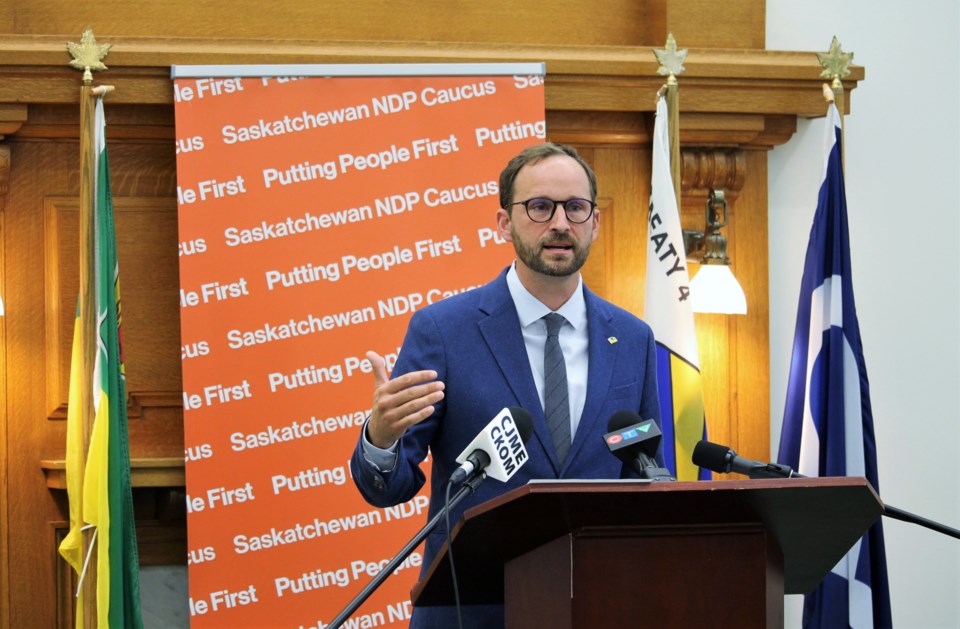It might be hard to believe for some who are new to this province, but at one time, not that long ago, the Saskatchewan New Democratic Party (NDP) was regarded as this province’s natural governing party.
From 1944-2007, they guided this province for 47 years. And when they were out of power, you often thought it was just a matter of time before they returned to office.
How times have changed. Thanks to successive lopsided election defeats, the NDP is no longer viewed as the natural governing party. And now their leader, Ryan Meili, has announced he will be stepping aside after less than four years on the job, triggering another leadership race.
Since former premier Lorne Calvert resigned in 2008, the NDP has had three leaders. None of them have been able to mount much of a challenge to the Saskatchewan Party. Meili actually had the most seats with 13 in the last election, but that’s a far cry from the 31 needed to form a majority government in this province.
And so when the next election rolls around in 2024, the NDP will have a different leader for the fifth straight election.
Nobody should question Meili’s intelligence. He’s likely been the smartest person in the room in most rooms he has ever entered. He’s brilliant. He can be a very dynamic and engaging individual. Not as captivating as former premier Brad Wall, but who is?
It should have been a boon for the NDP to have a physician as their leader in the midst of a pandemic.
But Meili also comes across as smug and arrogant. Whether that’s true or not, in the world of politics and elected office, you become what the electorate thinks you are.
One of the biggest concerns with Meili when he became leader was he was too left of centre to be elected premier. He wasn’t going to draw in the centrist or the centre-left voters.
Those predictions held true.
Support for the NDP is now lower in rural Saskatchewan than ever before. That’s not entirely Meili’s fault, but he is part of the problem. At one time, the NDP was at least guaranteed of finishing second in any ridings in which they didn’t win. In the last election, they were behind the Buffalo party of Saskatchewan in four ridings. And they had a parachute candidate in the Estevan riding.
The days of the NDP sweeping the Regina, Saskatoon, Prince Albert and Moose Jaw ridings appear to be over. The Sask. Party has a firm grip on a number of those seats, while still having their strong base in rural Saskatchewan.
The timing of Meili’s resignation also isn’t coincidental. He stepped down a few days after the NDP lost a by-election in the Athabasca constituency – a northwest riding that has long been one of their safe seats. To see a Sask. Party candidate win that riding was another blow for the NDP.
Yes, voter turnout was low, and it’ll likely be a completely different ball game for the 2024 provincial vote, but the bottom line is the NDP lost a riding they never would expect to lose.
As for the next NDP leader, Trent Wotherspoon has already said he won’t run. Nicole Sarauer is likely the strongest leader within the party, and she did a great job as interim leader, but does she want the job?
Regardless, the next NDP leader has an incredibly difficult task of trying to rebuild the party’s support throughout the province. The party needs to make a shift more towards the centre, appeal more to the centrist voters who have been without a party due to the dwindling presence of the Liberal Party. The NDP needs to do more to appeal to groups like small business owners.
Give them an alternative to vote for, and they might side with an NDP leader who fits their worldview. Not enough for the NDP to win in 2024, but enough to finally have a strong opposition and build towards 2028.
Above all else, the NDP needs to be patient with their new leader, and remember they are no longer Saskatchewan’s natural governing party.



